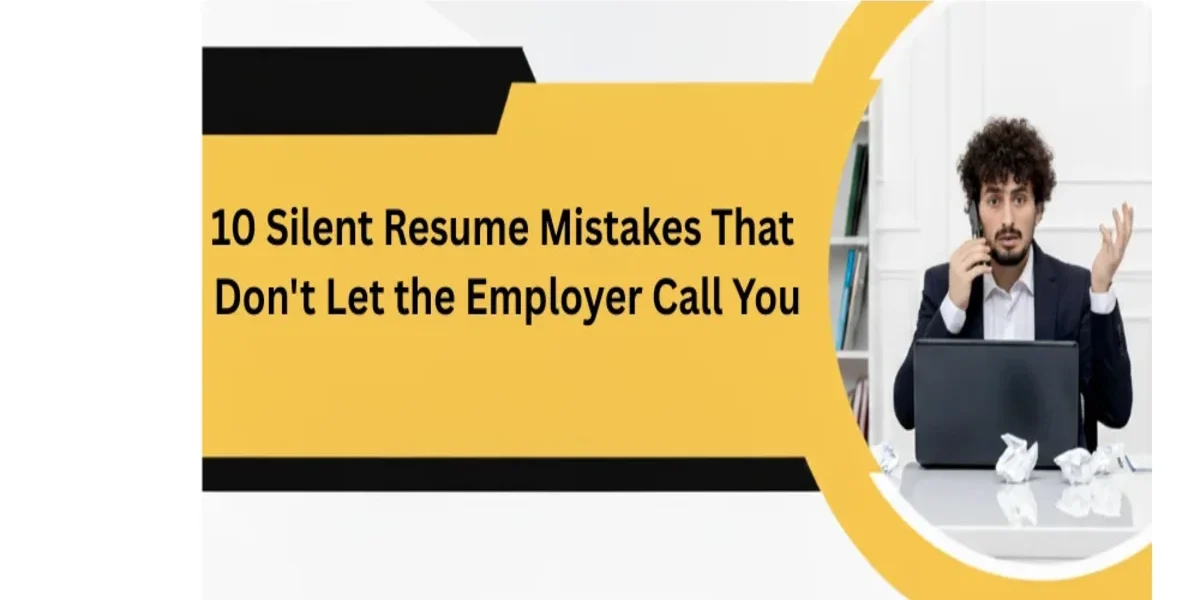Impatiently waiting for that one notification and refreshing your email every 10 minutes for the recruiting officer’s response is honestly the toughest part of job seeking.
And mind you, it is not just you and me. The employment records of almost 60% of candidates have common resume writing errors. Perhaps this is why so many applicants complain about not hearing back from the employers. These ‘apparently insignificant slipups’ are also the reason why your chances of getting interviewed are shrinking.
However, there isn’t just one reason behind it. There are many other practices, too. 10 of them are discussed in this blog. Make sure you don’t miss out on the chance of learning the basic resume writing skills.
Avoid 10 Resume Mistakes & Get Called for an Interview
A hard-to-swallow pill: CV rejections are brutally high, especially if you are not guided by resume writing help. Imagine watching more than half of the stack going straight to the trash. It is indeed confidence-breaking as it takes hours for a candidate to build a resume from scratch.
Only to be kicked out in seconds for one typo, weak phrasing, or generic layout. It is like walking through a minefield where every detail matters. Also, know that the recruiters skim fast, so your CV needs to hit hard from the first line. Nobody has time to decode your ghost sentences.
Why Resume Writing is Still Important in 2025
It is fair to question the importance of a curriculum vitae in 2025. After all, in what world is it possible to value the traditional ways when you already have LinkedIn profiles, online applications, and AI tools?

The answer is easy. Sometimes the simplest tools win. Your resume wins because it is the one place where you control the story. Unlike LinkedIn, where:
- The employers can only see the job title and not what you actually did.
- You get to choose which achievements to highlight more.
- There are no distractions from other profiles competing for attention.
Apart from this, flawless CV writing is important because it lets the hiring manager quickly scan qualifications. It also shows that the candidate made an effort. So, hire a resume writing help online today and save yourself from the avoidable mistakes that might cost you interviews.
Things a Recruiter Will Search for in an Employment Record
It is clever of you and genuinely praiseworthy to take preparing for a job interview this seriously in your job-seeking efforts. However, the basic sequential order suggests that you first understand the few resume expectations of an employer.
- Relevant experience
- Quantifiable achievements
- Job-specific keywords
- Skills match
- Clean, professional format
- Career stability
- Accurate contact information
- Key metrics
10 of the Biggest Blunders Made in Resume History
Mistake #1 – Missing Keywords
This is when the applicant has not included the industry-specific terms and required keywords in the content of the resume. As a result, the Applicant Tracking System (ATS) will completely ignore these documents.
Troubleshoot Idea
Your untailored content shows that you have zero effort in the application. So, to exhibit your interest in the role, you are advised to go through the social media and website of the business. Then use these important details from there to make your CV sound more tailored.
Mistake #2 – Grammatical Errors & Typos
Nearly 80% of recruiters are found to be directly rejecting the CVs because of typos and grammatical errors. It has been proven that this error bothers the recruiter and suggests a lack of attention to detail in the applicant.
Troubleshoot Idea
Assuming that the candidate’s work quality would be equally sloppy if hired, in almost all cases, the resume is trashed. To avoid this from happening, you can either hire a resume writing service that also provides editing support or use tools like Grammarly.
Mistake #3 – One-Size-Fits-All
Studies have concluded that at least one in every 3 candidates does not tailor their resume according to the job description. This lowers their odds of getting called in for an interview. Also, 83% of the hiring managers show a preference for personalized applications.
Troubleshoot Idea
So, to become the employer’s favorite, you must never go for generic resume templates. Such content fails to explicitly address the manager’s needs and is most likely irrelevant too. A useful tip is to read the job description at least three times and make bullet notes for focus.
Mistake #4 – Unprofessional Email
A striking 76% of resumes are ignored if the applicant’s email address is deemed unprofessional. We mean, just look at that number. It is three-fourths of the entire job-seeking community that do not get interview calls. That too, just for not writing a formal mailing ID.
Troubleshoot Idea
Unprofessional email IDs are highly frowned upon, and thus, you must always create a formal one if your existing one looks like funnyjohnny@abc.com. If necessary, look for a few sample CVs online to get the idea.
Mistake #5 – Only Responsibilities, No Results
A lot of times, the applicant makes the mistake of mentioning their roles without the impact that they created while being in those positions. They even forget to use the hard metrics that can increase their chances of getting a callback by 40%.
Troubleshoot Idea
The solution is to always mention quantifiable achievements because it is one of the few things that the employer expects from your employment record. Use phrases like ‘managed a team’ and ‘increased the sales by…’ that have action words in them.
Mistake #6 – Overly Long Content
Applicants who are not getting professional resume writing help at CV Masters or any other agency are relentlessly making this mistake. We are speaking of the classic ‘overdoing’ blunder. Where a single page is enough, candidates are submitting three full pages.
Troubleshoot Idea
3-page resumes are a bad idea. The employer wants concise and straightforward information about your past experiences; do not give him essays. Having a mentor or using top-rated templates can be very helpful in this regard.
Mistake #7 – Unclear Formatting
Up to 75% of qualified applicants have been rejected by an Applicant Tracking System (ATS) because the software couldn’t read their resumes. It is basic common sense. You cannot judge something when it is not even readable in the first place.
Troubleshoot Idea
A way out of this mistake is to make sure you follow the right format. But not everyone can DIY. So, it is better to hire a CV writing help service and let them guide you.
Mistake #8 – Job Hopping
When you mention your entire career journey to date in a CV, you mustn’t give the impression of job hopping. This is a recognized (almost) crime in resume writing because it signals instability to employers.
Troubleshoot Idea
Therefore, instead of mentioning so many roles with just a few months’ difference, try to group them all. You can also skip a few irrelevant ones and focus on achievement to show growth.
Mistake #9 – Exaggeration and Lies
Mentioning false information is another rising issue in recent years. Employers are done with such CVs, and they are convinced not to give any second chances to such applications. It is common sense that sooner or later the lies will be revealed, so do not try this at all.
Troubleshoot Idea
Rather than lying on the CV and getting blacklisted for misinformation, you can simply use the minimal experiences you have and coat them nicely with soft skills. This trick works because the recruiting managers value honesty, potential, and transparency.
Mistake #10 – Sending a Word Document
Sending a Word file seems like a petty issue, but it has a direct connection with you not receiving an interview call, first of all. The format may break. Secondly, it might not open well or just look messed up as the content is not locked in its space.
Troubleshoot Idea
A PDF is therefore a preferred format. It opens and views correctly on different devices. Moreover, unlike the Word files, no system blocks it, and your chances of getting a call stay unharmed. The PDF file also looks more professional and gives a nice first impression.
FAQ
- Is a resume different from a CV?
Yes. A resume is short and focused on skills and experience. A CV is longer and includes academic history, research, and publications. Resumes are used for jobs; CVs are common in academic or research roles.
- Should I include my GPA?
Include your GPA if it’s above average (usually 3.0 or higher) and you’re a recent graduate. If you have strong work experience, it’s okay to leave it out. Always check if the job posting asks for it.
- Can I use a template from the internet?
Yes, using a template is fine. Just make sure it’s clean, easy to read, and fits your style. Avoid overly fancy designs — simple layouts work best for most jobs and help recruiters find key info quickly.
- Is it okay to include volunteer work?
Absolutely. Volunteer work shows initiative, teamwork, and community involvement. It’s especially helpful if you lack paid experience or your volunteer role relates to the job. Include it like a regular experience with role, tasks, and impact.
Wrapping Up Everything
Speaking of resume writing, it is safe to say that a strong record will necessarily get you the recruiter’s response within a week. Yes, they will reach out to you if only you follow the guide and stay away from the mentioned 10 mistakes.
You must understand the fact that sometimes small actions lead to bigger events because this journey is a classic example of it. You make just two silly spelling errors in the introduction of your CV, and off it goes, right into the trash bin.

